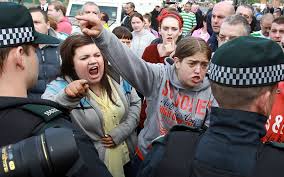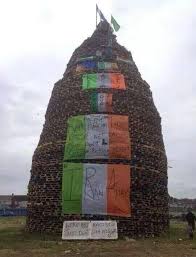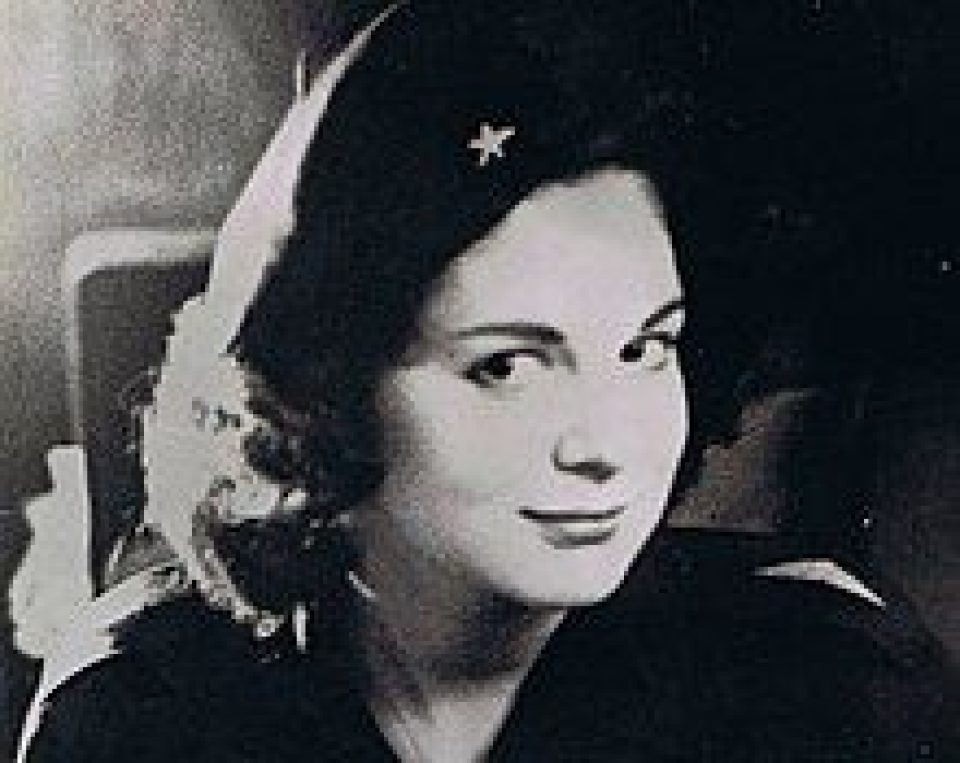Guest post by Sammy McNally
Long before the BBC was ever even dreamt of, Orangemen have been marching – marching both where they are welcome and marching where they are not welcome. The challenge for the BBC is to reflect the pomp and ceremony of those parades which are welcomed and to report on the controversies surrounding those parades which are not.
 Anyone viewing The Twelfth (BBC NI’s longest running outside broadcast programme ) which includes coverage from a number of locations in Northern Ireland of the marches on the public holiday of the 12th July, might reasonably, but incorrectly conclude, that there was little or no controversy associated with the parades featured therein.
Anyone viewing The Twelfth (BBC NI’s longest running outside broadcast programme ) which includes coverage from a number of locations in Northern Ireland of the marches on the public holiday of the 12th July, might reasonably, but incorrectly conclude, that there was little or no controversy associated with the parades featured therein.
In 2012, The Twelfth programme, was the subject of a complaint that the BBC had not complied with its own guidelines on impartiality in its coverage of the Belfast parade.
(Covered here by BangorDub https://bangordub.wordpress.com/2013/06/06/ )
The BBC Trust rejected the complainant’s contention that the Belfast parade was ‘very controversial’ (which in recent years is often followed by days of rioting) – a category with specific editorial requirements. (I think it safe to conclude none of the Trustees lived near the route of the Belfast parade).
The Trust also rather conveniently suggested that the Programme was part of a linked ‘series’ even though the programmes that is was ‘linked’ to were News programmes and suggested that any controversy was therefore covered by the News. And the Trust also concluded that the “programme did contain some references which acknowledged the controversial nature of parades in general and these were sufficient in the context of a programme that has such clearly defined ambitions and where the audience would have a pre-existing understanding of the underlying issues.”
In 2013 The Twelfth programme was again the subject of a complaint on the grounds that there was even less balance in the programme than the previous year. One can imagine that during the course of this complaint this might have been a cause for some concern for BBC (NI) as they would potentially have had to publically revise the format of a programme very popular with the Unionist community – at what continues to be a very sensitive time in the parading debate.
But BBC NI, need not have worried, in an extraordinary piece of logic the BBC Trust ruled that ‘The Committee agreed that the question for it was whether what BBC NI had done in 2013 was sufficient to achieve due impartiality according to the Guidelines. It noted that there are many ways to achieve due impartiality under the Guidelines. The Committee did not think it was necessary for the BBC to have gone about achieving due impartiality on this occasion in the same manner as it had done in the year before“.
So what was ‘sufficient’ in 2012 was not actually ‘necessary’ in 2013. An absolute gem from the Trust.
(Ruling Here, Published December 2014 http://downloads.bbc.co.uk/bbctrust/assets/files/pdf/appeals/esc_bulletins/2014/sep.pdf
)
What is perhaps most concerning about this piece of contorted logic, is that it appears to avoid the need to have any balance at all in a programme which is a TV celebration of a cultural event which is (very) controversial, often leads to serious public disorder and has damaging consequences for community relations.  In practical terms, as far the BBC Trust is concerned, the BBC, can bypass the need for balance by simply advancing the self-serving claim that such a promotional style of programme can be fairly viewed as part of series which includes News programmes.
In practical terms, as far the BBC Trust is concerned, the BBC, can bypass the need for balance by simply advancing the self-serving claim that such a promotional style of programme can be fairly viewed as part of series which includes News programmes.
Really?
By this logic the more controversial a topic then the greater will be the News coverage and the more the programme will comply with the guidelines. It is hard to believe that whoever drew up the BBC guidelines could have guessed that ‘linkage’ would be so (mis)used.
The BBC has helped build a (well-earned) reputation for impartiality by exploring the controversial aspects of Northern Ireland politics even during the height of the troubles but that reputation must surely be at risk – at least among the Nationalist community – by continuing to broadcast a programme – about an event, which is not only overtly political but has sectarian and paramilitary trappings – in such an unashamedly promotional way.
It is inconceivable to imagine a programme being broadcast in Britain which covers an event with such potential for public disorder and which is so offensive in sectarian (or racial terms) to a large section (44%) of the population? But this is of course, Northern Ireland, where things are different and it may be that the BBC Trust is mindful of the current political situation and wishes to avoid making any ruling which unsettles Unionist political opinion further. And that is perhaps  understandable – but that is not however the role that the BBC Trust was set up to perform nor is it the role that licence fee payers impacted upon by the parade or those who belong to the broader Nationalist community can reasonably expect the BBC Trust to perform.
understandable – but that is not however the role that the BBC Trust was set up to perform nor is it the role that licence fee payers impacted upon by the parade or those who belong to the broader Nationalist community can reasonably expect the BBC Trust to perform.
….but whatever spin the BBC Trust wishes to put on it – this is a programme which has evolved in its current format, when Nationalists in Northern Ireland were treated as, and seen as, second class citizens – and is at a minimum, badly in need of a serious (impartial) make-over – and is arguably way, way, past it’s sell by date.

> It is inconceivable to imagine a programme being broadcast in Britain which covers an event with such potential for public disorder and which is so offensive [to a proportion of] the population. But this is of course, Northern Ireland, where things are different …
To be deemed part of a series, did BBC offer any evidence to prove that The Twelfth (Events/Entertainment) was planned in conjunction with the regular news bulletins (News & Current Affairs) given that the reporters and producers seemed to be entirely separate?
LikeLike
Alan,
Good question.
I’m not sure they did – the Trust’s (very mild) requirement in linkage terms seems to revolve around ‘signposting’. I think in such a volatile scenario where the situation is changing rapidly(e.g. the leaders of the Belfast parade have not undertaken to comply with the law) it would be challenging to plan appropriately ‘linked’ news programmes.
ps Bangordub could you please put a ‘?’ after the 44% in the para highlighted by Alan.
LikeLike
Done Sammy
LikeLike
Thanks BD.
I have to say the analysis by the BBC of the talks at Stormo has been very poor. They really should have been able to come up a timeline showing how party positions have changed and words eaten. There was never going to be any agreement on parades – given the position of ‘no negotiating’ that the DUP had signed up to with the OO. Parades and flags has just been kicked down the road. Perhaps the BBC was quietly observing a don’t rock the boat policy whilst the talks were going on – but really pish poor analysis whatever the reason.
LikeLike
It was interesting how low down the list of stories on the BBC and ITV Main news bulletins this story ranked
LikeLike
Good article, Sammy, and well-argued. Just one point I’d quibble on: I don’t think BBC coverage of the Troubles was anywhere near even-handed.
LikeLike
Jude,
re. “I don’t think BBC coverage of the Troubles was anywhere near even-handed.”
Yes, that is probably true, most broadcasters follow the status quo, but I think the BBC did a very good job under the circumstances. Probably better than RTE. I think there was a genuine feeling that they would follow up on stories and not avoid difficult or uncomfortable answers and their investigative work was very good – something the current (mainland) BBC cannot be commended for.
LikeLike
Hi BD,
I’m going to go completely off topic just to advertise these roles becoming available at the very respectable online paper : “the detail”
http://www.thedetail.tv/columns/vacancy/two-data-journalist-vacancies-at-the-detail
They are looking for data crunchers who can analyse, articulate and map data before delivering it in hard hitting articles. These blogs are filled with people (like myself) who do this stuff for free because we’re interested in it. Therefore might be an opportunity for a contributor to get a paying career out of doing something they enjoy. I’m happy with my own career, so it’s not for me but thought it’s worth disseminating.
Charlie
LikeLike
Thanks for that Charlie!
Sounds like a dream job 😉
BD
LikeLike
Marty announces to the world the revised British policy on parades (which SF have been demanding) the DUP are obviously fuming that their panel idea has now been lost and SF can claim victory whilst publically stripping that fig leaf from Robbo – a fig leaf which helped avoid unbridled sirpatrickmayhem during the Belfast 12th July parade, a parade which the BBC was trumpeting as a festival – whilst not mentioning the simmering sectarian tensions just below the surface with not only the potential for serious unrest on the streets but the potential of totally undermining the Stormo political edifice.
Total twaddle from the Beeb.
LikeLike
Well Put Sammy!
LikeLike
On BBC NI this week – they used the M word when referring to the Ballymurphy killings in relation to visit of the boul Enda on his trip up North.
They had just been reporting the Kingmills ‘murders’ and then moved on to discuss the Ballymuphy ‘murders’. The term was used both in the studio and by the Reporter.
I didn’t hear any reports of complaints but assume they must have quite fulsome…
LikeLike